|
PAGE
2 of 6 pages
THEre ARE Various
Versions of THE CHILDHOOD AND
YOUTH of Jesus Christ, SO to be INTELLECTUALLY HONEST, I MUST GIVE each
VERSION AT LEAST some mention.
|

|
"PERFECT"
CHILD AND "PERFECT" YOUTH
Ellen
G. White
Excerpted and condensed from 3
chapters of "Desire of Ages" copyright 1898 by
Pacific Press Publishing Co.
"As a Child" pg
68-74 "The
Passover Visit" pg 75-83 "Days of Conflict" pg 84-92
|
"As a Child"
"The
childhood and youth of Jesus were spent in a little mountain
village. There was no place on earth that would not have been
honored by his presence. The palaces of kings would have
been privileged in receiving him as a guest. But he passed
by homes of wealth, the courts of royalty, and the renowned seats
of learning, to make his home in obscure and despised
Nazareth." Comment: Here we can assume that Jesus (as God)
had a choice as to where he would be incarnated, or
born. And that "choice" was Nazareth.
"Wonderful in its significance is the brief record of His
early life: 'The Child grew, and waxed strong in spirit,
filled with wisdom: and the Grace of God was upon Him.' In
the sunlight of His Father's countenance, Jesus 'increased in
wisdom and stature, and in favor with God and man.' Luke
2:52. His mind was active and penetrating, with a
thoughtfulness and wisdom beyond His years. Yet His
character was beautiful in its symmetry. The powers of
mind and body developed gradually, in keeping with the laws of
childhood." Comment: Here Ellen White is rejecting the
premise of both the "Infancy Gospels" quoted on the
previous page, that Jesus had unusual powers to perform childhood
miracles, and unusual knowledge with no need to learn as other
children.
"As a child, Jesus manifested a peculiar loveliness of
disposition. His willing hands were ever ready to serve
others. He manifested a patience that nothing could
disturb, and a truthfulness that would never sacrifice
integrity. In principle He was firm as a rock, His life
revealed the grace of unselfish courtesy." Comment: Very
close to the Latin Infancy account ---but quite the opposite to
what is revealed by the author of The Infancy Gospel of Thomas
-- an angry, vindictive Child that lashed out at everyone that
crossed him.

"With
deep earnestness the mother of Jesus watched the unfolding of His
powers, and beheld the impress of perfection upon His
character. With delight she sought to encourage that bright,
receptive mind. Through the Holy Spirit she
received wisdom to cooperate with the heavenly agencies in the
development of this Child, who could claim only God as His
father.
"The
Child Jesus did not receive instruction in the synagogue
schools. His mother was His first human teacher. From
her lips and from the scrolls of the prophets, He learned of
heavenly things. The very words which He Himself had spoken
to Moses for Israel He was now taught at His mother's knee.
As He advanced from childhood to youth, He did not seek the
schools of the rabbis. He needed not the education to
be obtained from such sources, for God was His instructor."
The
life of Jesus was a life in harmony with God. While he was a
child, he thought and spoke as a child, but no trace of sin marred
the image of God within Him. Yet he was not exempt
from temptation, The inhabitants of Nazareth were proverbial
for their wickedness. The low estimate in which they were
generally held is shown by Nathaniel's question, 'Can any good
thing come out of Nazareth?' John 1:46. Jesus was placed
where His character would be tested. It was necessary for
Him to be constantly on guard in order to preserve His
purity. He was subject to all the conflicts which we have to
meet, that He might be an example to us in childhood, youth, and
manhood."
"Christ
was the only sinless one who ever dwelt on earth; yet for nearly
thirty years He lived among the wicked inhabitants of
Nazareth. This fact was a rebuke to those who think
themselves dependent on place, fortune, or prosperity, in order to
live a blameless life. Temptation, poverty, adversity,
is the very discipline needed to develop purity and
firmness."
"As
long as He lived among men, our Savior shared the lot of the
poor. He knew by experience their cares and hardships,
and He could comfort and encourage all humble workers.
Those who have a true conception of the teaching of His life will
never feel that a distinction must be made between classes, that
the rich are to be honored above the worthy poor."
"The
Savior condescended to poverty, that He might teach how closely we
in a humble lot may walk with God. He lived to please,
honor, and glorify His Father in the common things of
life. His work began in consecrating the lowly
trade of the craftsmen who toil for their daily bread.
He was doing God's service just as much when laboring at the
carpenter's bench as when working miracles for the
multitude."
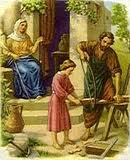
Comment:
Ellen White never questioned several misconceptions that are
supported in the surface Gospel story, including that Jesus spent
no time gaining a formal education, that he lived thirty years in
Nazareth, and that he was a carpenter by trade. I will
indeed question all these supposed "facts" in my page on
Jesus as an Essene "Messiah".
|
|
|
"The Passover Visit"
"Among the Jews
the twelfth year was the dividing line between childhood and
youth. On completing this year a Hebrew boy was called a son of the
law, and also a son of God. He was given special
opportunities for religious instruction, and was expected to
participate in the sacred feasts and observances. It was
in accordance with this custom that Jesus in His boyhood made the
Passover visit to Jerusalem. Like all devout Israelites, Joseph
and Mary went up every year to attend the Passover; and when Jesus had
reached the required age, they took Him with them."
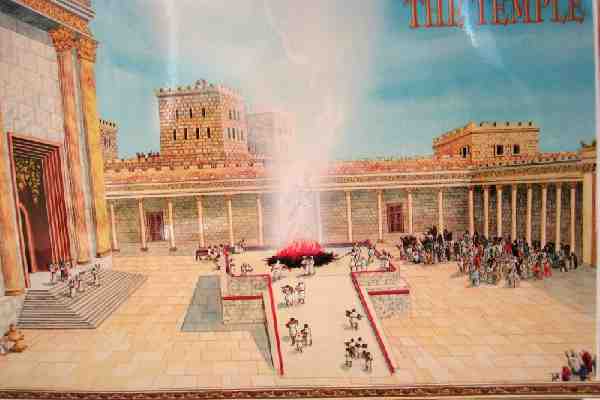
"For the first time
the Child Jesus looked upon the temple. He saw the
white-robed priests performing their solemn ministry. He
beheld the bleeding victim upon the altar of sacrifice. With
the worshippers He bowed in prayer, while the cloud of incense
ascended before God. He witnessed the impressive rites of the
paschal service. Day by day He saw their meaning more
clearly. Every act seemed to be bound up with his own
life. New impulses were awakening within Him. Silent and
absorbed, He seemed to be studying out a great problem. The
mystery of His mission was opening up to the Savior."
"Rapt in the
contemplation of these scenes, He did not remain beside His
parents. He sought to be alone. When the paschal services
were ended, He still lingered in the temple courts; and when the
worshipers departed from Jerusalem, He was left behind."
"At that day an
apartment connected with the temple was devoted to a sacred school,
after the manner of the schools of the prophets. Here leading
rabbis with their pupils assembled, and hither the Child Jesus came.
Seating Himself at the feet of these grave, learned men, He listened
to their instruction. As one seeking for wisdom, He questioned
these teachers in regards to the prophecies, and to events then taking
place that pointed to the advent of the Messiah."
Comment: Here
Ellen White, who wrote this chapter before 1898, is merely guessing
about the meaning of Jesus' Jerusalem encounter with the
"Doctors" (Luke 2:41-52), as were everyone else before the
discovery of the Dead Sea Scrolls in the 1940s and 1950s. People
knew before that about the "Essene Gate" not far from the
temple, but were unaware that the Essenes owned that whole section of
Jerusalem. Essenes were "doctors" in more than one
way, providing most of the medical treatments of that day. Jesus
was there as an Essene youth, being tested by the Essenes for his
religious and political preferences. More about this
later!
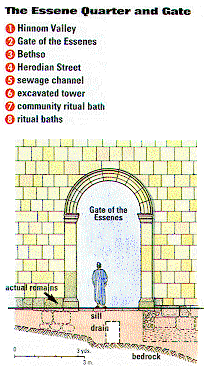
"Meanwhile
Joseph and Mary were in great perplexity and distress. In the
departure from Jerusalem they had lost sight of Jesus, and they knew
not that He had tarried behind. The country was then densely
populated, and the caravans from Galilee were very large. There
was much confusion as they left the city. On the way the
pleasure of traveling with friends and aquaintences absorbed their
attention, and they did not notice His absence till night came
on. Then as they halted for rest they missed the helpful
hand of their Child. -- Returning to Jerusalem, they
pursued their search. The next day, as they mingled with the
worshippers in the temple, a familiar voice arrested their
attention. They could not mistake it, no other voice was like
His, so serious and earnest , yet so full of melody."
"In the schools of the Rabbis they found Jesus. Rejoiced as
they were, they could not forget their grief and anxiety. When
He was with them again, the mother said, in words that implied
reproof, 'Son, why hast Thou thus dealt with us? Behold,
thy father and I have sought Thee sorrowing."
"How is it that ye sought Me? answered Jesus. 'Wist ye
not that I must be about My Father's business?"
Comment: Here Ellen White gives the usual explanation that the
twelve-year-old Jesus was already, upon watching the Passover service,
contemplating a course of action that would see Him crucified 21 years
later as "The Lamb of God" that taketh away the sins of the
world. But there are other explanations for this statement
of Jesus the Essene youth, that we will contemplate later. |
|
"Days of Conflict"
Here is where Ellen White's portrayal of the early life of Jesus Christ
falls far short of the actual history of the Essene son of Joseph and Mary
because of her lack of knowledge of the Essenes. She had the
excuse that the Dead Sea Scrolls had not yet been discovered. We
have no such excuse, but everyone loves the old stories better, so they
are repeated endlessly just like no one ever heard of the Essenes.
But in the case of Jesus being the oldest of Joseph's sons, not the
youngest, Ellen White should have known better!
She has fallen into a Jesuit trap designed from
ancient times to make Mary an ever-virgin, with no son but Jesus,
conceived miraculously.
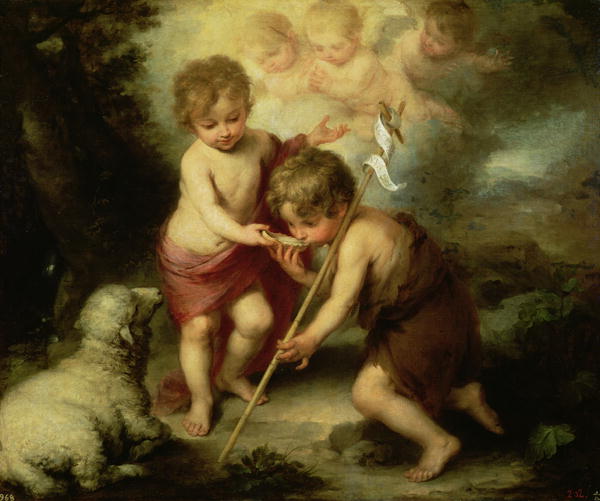
"From
its earliest years the Jewish child was surrounded with the requirements
of the rabbis. Rigid rules were prescribed for every act, down
to the smallest details of life. Under the synagogue teachers the
youth were instructed in the countless regulations which as orthodox
Israelites they were expected to observe. But Jesus did not
interest Himself in these matters. From childhood He acted
independently of the rabbinical laws. The Scriptures
of the Old Testament were His constant study, and the words, 'Thus saith
the Lord,' were ever upon His lips."
"In a
gentle and submissive way, Jesus tried to please those with whom He came
in contact. Because He was so gentle and unobtrusive,
the scribes and elders supposed that He would be easily influenced by
their teaching. They urged Him to receive the maxims and
traditions that had been handed down by the ancient rabbis, but He asked
for the authority in Holy Writ. He would hear every word that
proceeds from the mouth of God; but He could not obey the inventions of
men. Jesus seemed to know the Scriptures from beginning to
end, and He presented them in their true import. The rabbis were
ashamed to be instructed by a child. They claimed that it
was their office to explain the Scriptures, and that it was His place to
accept their interpretation. They were indignant that He should
stand in opposition to their word."
Comment:
I have shown elsewhere that wherever Jesus in the Gospels appears to be
disagreeing with the traditions of the rabbis he is instead supporting the
rules and traditions of the Essenes, which differed markedly from those of
orthodox Judaism. Of course Ellen White could not know this, because
the Essene rules and practices were not available to us until the 1950s
and some were not translated and explained properly until the 1990s.
"His
brothers, as the sons of Joseph were called, sided with the rabbis..
They insisted that the traditions must be heeded, as if they were the
requirements of God. They even regarded the precepts of men more
highly than the word of God, and they were greatly annoyed at the clear
penetration of Jesus in distinguishing between the false and the
true. His strict obedience to the law of God they condemned as
stubbornness. They were surprised at the knowledge and
wisdom He showed in answering the rabbis. They knew He had not
received instruction from the wise men, yet they could not but see that He
was an instructor of them. They recognized that His education was of
a higher type than their own. But they did not discern that He had
access to the tree of life, a source of knowledge of which they were
ignorant."
"All
this displeased His brothers. Being older than Jesus, they felt
that He should be under their dictation. They charged Him with
thinking Himself superior to them, and reproved Him for setting
Himself above the priests and rulers of the people. Often they
threatened and tried to intimidate Him; but He passed on, making the
Scriptures His guide." |
 |
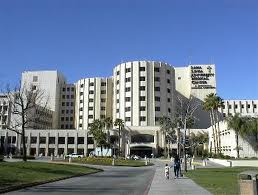
|
| Dr. Robert Flewelling
Holt, MD |
Doctor Holt's alma
mater, Loma Linda University |
|
Dr. Robert Holt md, mph, who
spent a lot of the money he made as an Emergency Room Physician in
various North Carolina Emergency Rooms, including Ahoskie, Onslow
Memorial Hospital in Jacksonville, Sampson County Memorial Hospital in
Clinton, Bladen County Hospital in Elizabethtown, Good Hope Hospital in
Erwin, and Cherokee Indian Hospital in Cherokee, traveling all over the
world doing research on the Essenes, and the origins of the Bible and of
Christianity,--has been to both Qumran by the Dead Sea and Kashmir in
the Himalaya Mountains. And also the Damascus in Syria, where
Saul of Tarsus had the experience described in both Acts and in his own
epistles as a "light" that blinded him, cured by three days of
instruction by a person that turns out to be Simon Magus in
disguise.
Similar attention
to detail allows us to discover that Jesus' younger brother James, born
6 years after Jesus, after Joseph and Mary were properly married, was
after James reached near adulthood, a cause of contention in this
family. James was the favorite of Caiaphas and
some other High Priests at the Jerusalem temple, to be the Messiah
of the Essenes. The conflict of Jesus with his brothers, the
subject of Ellen White's chapter 9 of Desire of Ages, was
not about beliefs and laws, all these brothers of Jesus, all younger
than he was, were Essenes. The conflict was about
competition for the same Essene position, that of the Essene
"Messiah" of the bloodline of King David. After
Jesus was crucified, James took his place.
|
|

